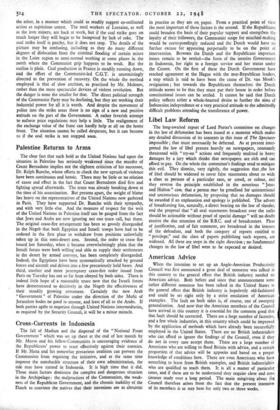Cross-Currents in Indonesia
The fall of Madiun and the dispersal of the "National Front Government " which was set up there at the end of last month by Mr. Musso and his fellow-Communists is• encouraging evidence of the Republicans' power to react effectively against their enemies. If Mr. Hatta and his somewhat precarious coalition can prevent the Communists from regaining the initiative, and at the same time improve the ramshackle structure of their own administration, the tide may have turned in Indonesia. It is high time that it did. Three main factors dominate the complex and dangerous situation in the Archipelago: the malpractices of the Communists, the weak- ness of the Republican Government, and the chronic inability of the Dutch to convince the natives that their intentions are as altruistic
in practice as they are on paper. From a practical point of view the most important of these factors is the second. If the Republicans could broaden the basis of their popular support and strengthen the loyalty of their followers, the Communist scope for mischief-fnaking would be correspondingly reduced and the Dutch would have no further excuse for appearing perpetually to be on the point of intervention. Between the Dutch and the Republicans important issues remain to be, settled—the form of the interim Government in Indonesia, her right to a foreign service and her status under the Crown. On the first of these the Dutch Government have reached agreement at the Hague with the non-Republican leaders, a step which is said to have been the cause of Dr. van Mook's resignation ; but towards the Republicans themselves the Dutch attitude seems to be that they must put their house in order before constitutional issues can be settled. It cannot be said that Dutch policy reflects either a whole-hearted desire to further the aims of Indonesian independence or a very practical attitude to the admittedly difficult problems attending the transference of power.


































 Previous page
Previous page